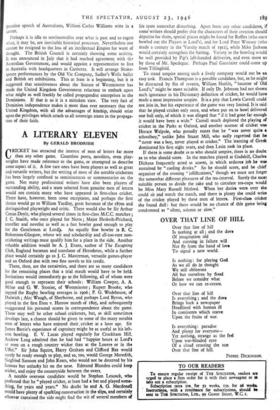A LITERARY ELEVEN
By GERALD BRODRIBB
CRICKET has attracted the interest of men of letters far more than any other game. Countless poets, novelists, even play- wrights have made reference to the game, or attempted to describe some aspect of it. A few rare ones have been players as well as great and versatile writers, but the writing of most of the notable cricketers has been largely confined to reminiscences or commentaries on the game. Not many professional writers have also been players of outstanding ability, and a team selected from genuine men of letters would not contain many who have appeared in first-class cricket. There have, however, been some exceptions, and perhaps the first choice would go to William Yardley, great batsman of the 187os and distinguished playwright and critic. There would also be Sir Arthur Conan Doyle, who played several times in first-class M.C.C. matches ; J. C. Snaith, who once played for Notts ; Major Hesketh-Prichard, traveller and novelist as well as a fast bowler good enough to play for the Gentlemen at Lord'is. An equally fine bowler is IL C. Robertson-Glasgow, whose wit and scholarship and all-too-rare non- cricketing writings must qualify him for a place in the side. Another valuable addition would be A. J. Evans, author of The Escapting Club, England batsman and translator of Herodotus, while a further place would certainly go to J. C. Masterman, versatile games-player and an Oxford don with two fine novels to his credit.
These, then, are the certainties, and there are so many candidates for the remaining places that a trial match would have to be held. Invitations would immediately go to the following, all of whom were good enough to represent their schools : William Cowper, A. A. Milne and G. W. Stonier, of Westminster ; Rupert Brooke, who topped the Rugby bowling averages in 1906 ; P. G. Wodehouse, of Dulwich ; Alec Waugh, of Sherburne, and perhaps Lord Byron, who played in the first Eton v. Harrow match of 1805, and subsequently exaggerated his personal scores in correspondence about the game. There may well be other school cricketers, but, as skill sometimes develops late, a chance should be given to some of the many notable men of letters who have enjoyed their, cricket at a later age. Sir James Barrie's experience of captaincy might be as useful as his left- arm bowling. E. V. Lucas played regularly for Crockham Hill. Andrew Lang admitted that he had had " happier hours at Lord's or even on a rough country wicket than at the Louvre or in the Uffizi." Sir John Squire, Harry Graham and Clifford Bair would surely be ready enough to play, and so, too, would George Meredith, Siegfried Sassoon and John Keats, who would not be deterred by his famous but unlucky hit on the nose. Edmund Blunden could keep wicket, and enjoy the countryside between the overs.
A notable overseas candidate would be Stephen Leacock, who professed that he " played cricket, at least had a bat and played some- thing, for years and years." No doubt he and A. G. Macdonell would have plenty of sparkling conversation in the slips, and certainly whoever captained the side might find the wit of several members of his team somewhat disturbing. Apart from any other candidates, if some writers should prefer that the characters of their creation should deputise for them, special places might be found for Raffles (who once bowled out the Players at Lord's), and for Lord Peter Wimsey (who made a century in the 'Varsity match of 1911), while Mike Jackson would certainly strengthen the batting. Variety to the bowling would be well provided by Pip's left-handed deliveries, and even more so by those of Mr. Spedegue. Perhaps Paul Gauvinicr could come up from Tillingfold.
To stand umpire among such a lively company would not be an easy task. Francis Thompson is a possible candidate, but, as he might be distracted by fits of reverie, William Hazlitt, "haunter of Old Lord's," might be more suitable. If only Dr. Johnson had not shown such ignorance in his Dictionary definition of cricket, he would have made a most impressive umpire. It is a pity that Lewis Carroll could not join in, but his experience of the game was very limited. It is said that he played cricket only once, and when put on to bowl delivered one ball only, of which it was alleged that " if it had gone far enough it would have been a wide." Carroll much deplored the playing of cricket in the Parks at Oxford, and another scorner of cricket was Horace Walpok, who proudly states that he " was never quite a schoolboy," unlike John Smart Mill, who sadly regretted that he " never was a boy, never played at cricket." The learning of Greek dominated his first eight years, and then Latin took its place.
If there is some doubt as to who should umpire, there is no doubt as to who should score. In the matches played at Gadshill, Charles Dickens frequently acted as scorer, in which arduous job he was sustained by " cooling drinks." So he should score, and be chief organiser of the evening " jollifications," though we must not forget the somewhat different pleasures of the tea-interval. Surely the most suitable person to divide the cake and to circulate tea-cups would be Miss Mary Russell Mitford. When her duties were over she could sit and watch the match, and there is plenty she could write of the cricket played by these men of letters. First-class cricket she found dull : but there would be no chance of this game being condemned as " silent, solemn or slow."


























 Previous page
Previous page